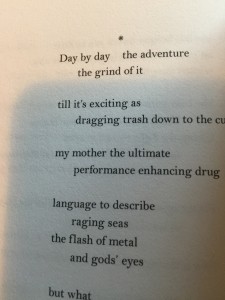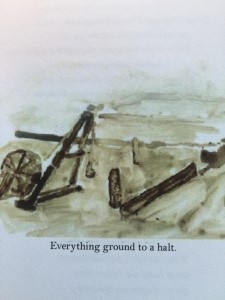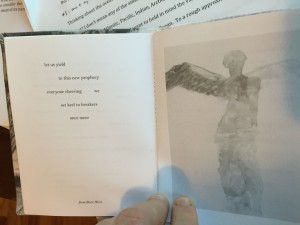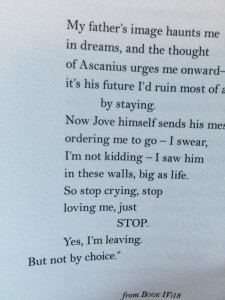A year ago November I was walking around with the first bits of David Hadbawnik’s translation of Virgil in my pocket and thinking about what it means to be a lover of peotry and ambivalent creature of empire. Two more chapbooks arrived last month — the first wrapped gifts of my holiday season — and though I’m still swirling inside the postlapserian chaos of Inherent Vice — I’ve got about 4 hours to go on the audiobook and am plotting a return trip to the movie — the Aeneid remains the poem that won’t go away. I’m so happy that David’s continuing to work on these translations. Poetic stocking-stuffers for everyone!
This year’s installment is books 3 and 4, Aeneas telling the story of his post-Troy wanderings followed by his abandoning of Dido and her suicide. The two slim volumes with their small pages and short lines have a miniaturizing force, compressing the hero’s wanderings and queen’s erotic tragedy into sharply turned phrases and shocking revelations. Listen to Polydorus, Trojan refugee slain by the treacherous Thracian king after the great city’s fall. He’s been transformed into a bush, and when Aeneas tries to clear ground for his weary soldiers to settle, the bush bleeds and protests:
AENEAS
why must you tear at me?
I’m someone you know, a poor
bastard not worth dirtying
those pious hands over (from III.04)
The human cost of empire is the core subject of the epic, and the millennia after Virgil first dedicated his poem to the emperor Augustus have seen major shifts in attitudes toward imperial unity. Hadbawnik’s lines capture the boredom and sudden terror of empire building, the pain of being a human being forced to uphold more-than-human values. Wandering with his fleet of refugees, Aeneas follows his mother Venus through the mysteries of the Med:
Day by day the adventure
the grind of it
till it’s as exciting as
dragging the trash down to the curb —
my mother the ultimate
performance enhancing drug
language to describe
raging seas
the flash of metal
and gods’ eyes
but what
of the human heart
its dangers
its moments of being
becalmed (from III.22)
 The dramatic climax of this section is Aeneas’s decision, prompted by divine call, to abandon Dido, Queen of Carthage, and sail for his destiny in Italy. Hadbawnik’s book 4 mostly inhabits the doomed Queen’s point of view, sympathizing with her desperate supernaturally-fueled love for the hero who will leave her. It’s hard not to see Aeneas as a monster, even if it’s Dido who, in her parting curse to the departing Trojan fleet, occupies the structural position of Homer’s Polyphemous cursing Odysseus and his escaping men.
The dramatic climax of this section is Aeneas’s decision, prompted by divine call, to abandon Dido, Queen of Carthage, and sail for his destiny in Italy. Hadbawnik’s book 4 mostly inhabits the doomed Queen’s point of view, sympathizing with her desperate supernaturally-fueled love for the hero who will leave her. It’s hard not to see Aeneas as a monster, even if it’s Dido who, in her parting curse to the departing Trojan fleet, occupies the structural position of Homer’s Polyphemous cursing Odysseus and his escaping men.
Traditional and imperial readings insist that the hero must found Rome, and that Dido’s fantasy of an imperial Carthage — “With Trojan arms, there’s no telling what Carthage could do,” fantasizes Dido’s sister Anna (from IV.04) — represent world-historical revisionism, a binding-in of north Africa into what could only be the Roman empire. What I enjoy most about Hadbawnik’s stripped-bare versification of Dido’s tragedy is how the fragments humanize, as if the great Queen, model for so many tragic heroines of European literature, can only speak in bits.
“Where do you run to,” she says to Aeneas, “as I / run to death?” (from IV.16).
Her fate is fire, and its flames peek out from the start of book 4. It starts with love’s “hidden fire / in her veins” (from IV.01), moves from imagined bridal torch to an inner burning that “ate tender marrow / Wound turned silently inside her” (from IV.05) to the gods’ flickering flame in the couple’s hidden rendezvous in a secret cave:
Earth and Juno gave the sign
flame flickered heaven conspired
nymphs
wailed from the highest summit. (from IV.09)
Aeneas makes his lame excuse when Dido catches him — “Yes, I’m leaving / But not by choice” (from IV.18) — but it’s her rage and flames that dominate book 4. Her curse will follow him to Italian shores:
Once cold death yanks my soul
from my limbs my ghost
will be everywhere. (from IV.22)
In a faux-theatrical dialogue between “V.” (Virgil?) and “D.” (Dido presumably, not Dante?), she describes her plot to upstage the imperial hero. At the end of this book, at least, our attention isn’t forced toward the future:
Blood, piss, shit
gush out of me staining
my dress. I life my eyes.
Three times I try to lift
my body, three times I fall […]
Iris clips a lock of my hair
with her right hand
and all at once the heat
eases and my life
flies away in the wind (from IV.30-31)
I’m looking forward to seeing what this translation does with the next two books, the funeral games for Anchises and visit to the Underworld.



Leave a Reply